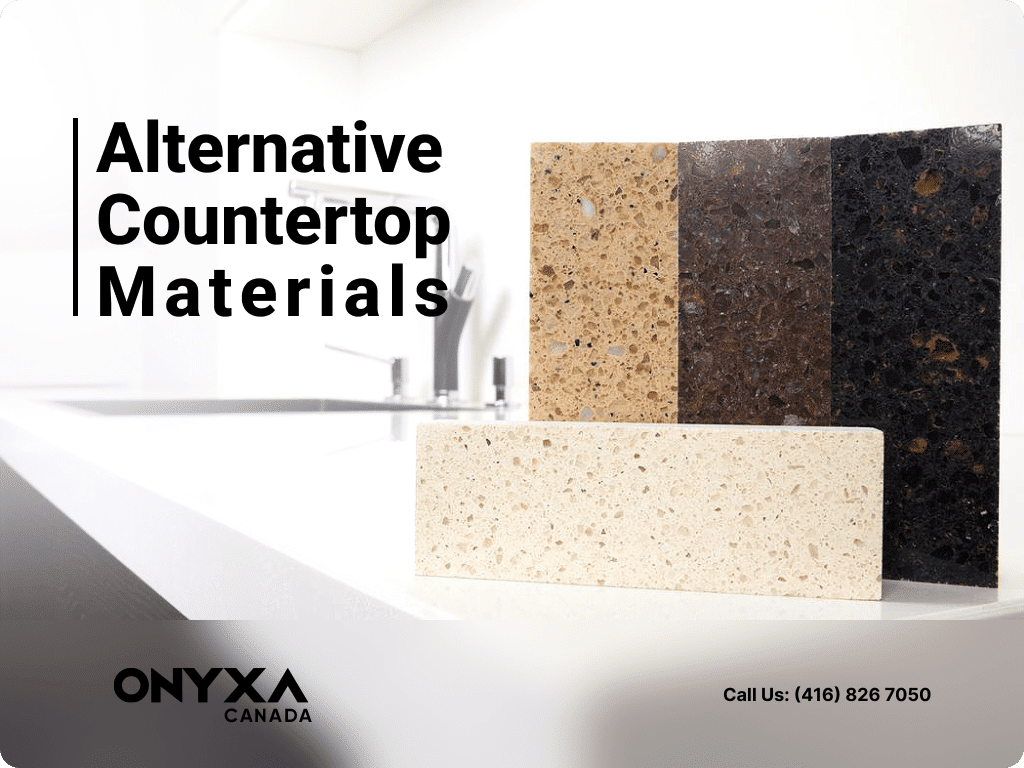Granite has established itself as a preferred choice for countertops, albeit with a price tag that might raise eyebrows. Fortunately, if you’re in the market for a wallet-friendly alternative to granite, an array of options beckons. You needn’t compromise on sturdiness or the returns on your investment.
In the realm of alternatives, porcelain slabs emerge as an enticing contender. Consider the likes of Onyxa, a reputable porcelain supplier that offers appealing value without putting undue pressure on your financials. Opting for Onyxa means embracing enduring quality that conserves both your time and finances down the road. These slabs are engineered for resilience over time and necessitate nominal maintenance – a double win.
Granite countertops carry a price spectrum spanning $80 to $175 per square foot, not to mention the regular sealing and upkeeping they demand.
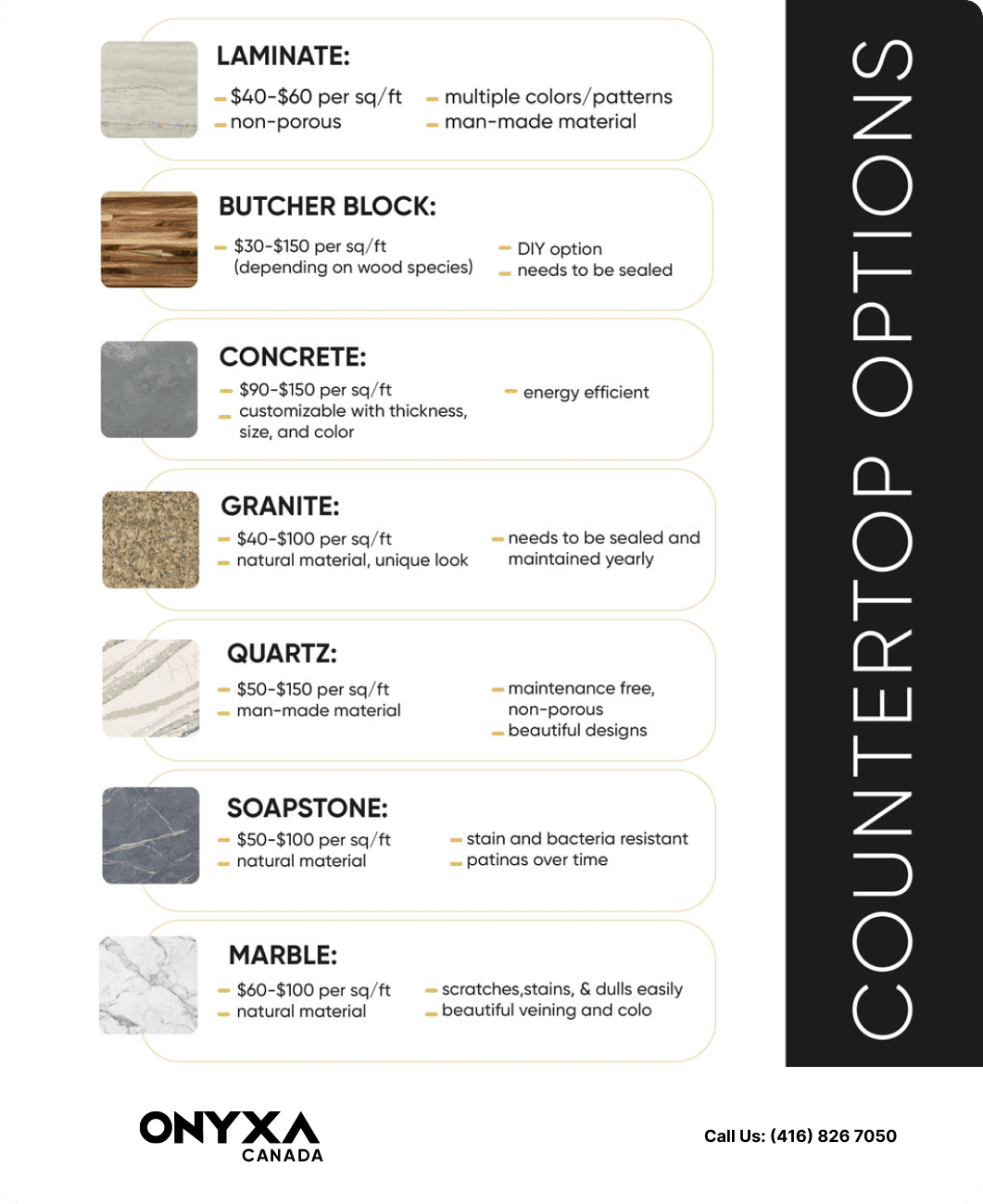
Intrigued by the notion of uncovering cost-effective stand-ins for granite countertops? Stay with us as we voyage through a medley of countertop materials. Here, you’ll unearth options that sync harmoniously with your budget while amplifying the aesthetics and practicality of your treasured living spaces.
Exploring the Best Alternative Countertop Materials:
#1. Porcelain Slabs:
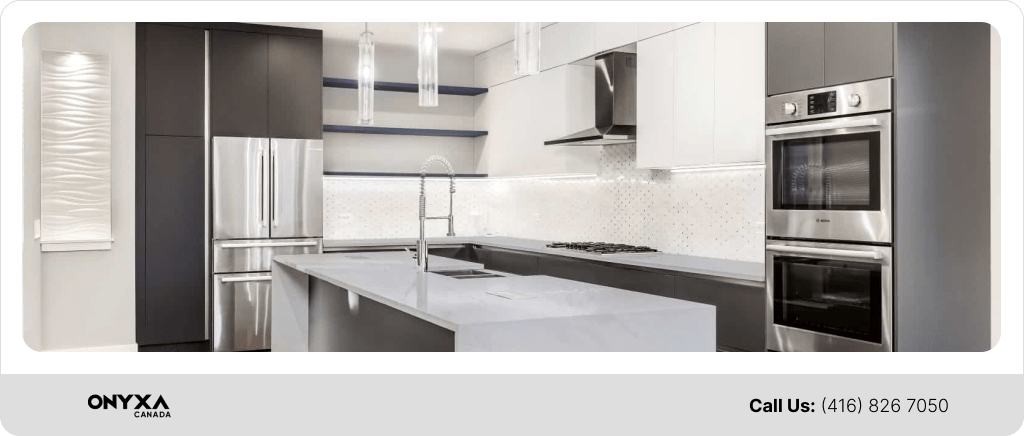
Porcelain slabs are the perfect blend of beauty and durability for kitchen countertops.
These surfaces effortlessly combine style and strength, adding a touch of sophistication to your space that lasts. With easy upkeep and minimal fuss, porcelain slabs keep their charm intact.
Whether you’re a cooking pro or enjoy your kitchen, porcelain slabs offer a reliable and stunning backdrop for culinary adventures. Get ready to cook, create, and enjoy in style!
Pros:
- Durability:
Porcelain slabs are highly durable and resistant to scratches, chipping, and general wear and tear. - Heat Resistance:
They can handle high temperatures without damage, making them ideal for cooking and baking. - Stain Resistance:
Porcelain slabs are non-porous, preventing liquids and stains from seeping into the surface. - Design Versatility:
They come in various colours, patterns, and finishes, offering multiple design options. - Low Maintenance:
These slabs require minimal upkeep and are easy to clean with regular household cleaners. - Hygienic:
Non-porous surfaces hinder the growth of bacteria and mould, maintaining a cleaner kitchen environment. - Longevity:
With proper care, porcelain slabs can last many years without significant wear.
Cons:
- Brittleness:
While durable, porcelain slabs can be more brittle than some natural stones, making them susceptible to chipping if subjected to heavy impact. - Installation Complexity:
Due to their size and weight, installing porcelain slabs may require professional help to ensure a proper fit. - Cost Variability:
The price can vary depending on the brand, design, and quality of porcelain slabs. - Cracking Risk:
Improper installation or extreme force could lead to cracking, necessitating careful handling and installation. - Limited DIY Repairs:
Unlike some materials, repairing chipped or cracked porcelain slabs may be challenging and require professional assistance.
Cost Overview:
The cost of porcelain slabs can vary based on brand, design, and quality factors. Porcelain slabs typically range from $50 to $100 per square foot. It’s important to consider that while the initial investment may be higher, the durability and low maintenance of porcelain slabs often make them a cost-effective choice in the long run.
Remember that additional installation and customization costs should also be factored into your budget.
Top 3 Porcelain Slab Styles for Your Kitchen Countertops
Here are the top porcelain slab styles that can elevate your kitchen countertop
- Carrara Marble-look Porcelain Slabs:
Reflecting the enduring beauty of Carrara marble, these porcelain slabs offer a timeless choice for kitchen countertops. The gentle veining and textured patterns echo the classic elegance of natural marble. The
ir soft gray tones contribute to a refined ambiance, while the durability of porcelain ensures a long-lasting surface that’s easy to maintain amidst daily kitchen activities. - Concrete-inspired Porcelain Slabs:
Concrete-inspired porcelain slabs introduce a contemporary touch to kitchen countertops. These slabs capture the rugged character of concrete while providing the benefits of porcelain’s durability. Their excellent and neutral hues offer a versatile backdrop for various kitchen styles, promising resilience in the face of regular usage. - Calacatta Gold Porcelain Slabs:
Drawing inspiration from the lavish beauty of Calacatta marble, these porcelain slabs infuse a sense of luxury into kitchen spaces. The intricate gold veining set against a pristine white background creates a visually striking effect. However, it’s not just about appearances; the non-porous surface ensures easy maintenance, and the inherent robustness of porcelain guarantees a countertop that can withstand the rigours of everyday cooking.
#2. Quartz Countertops:
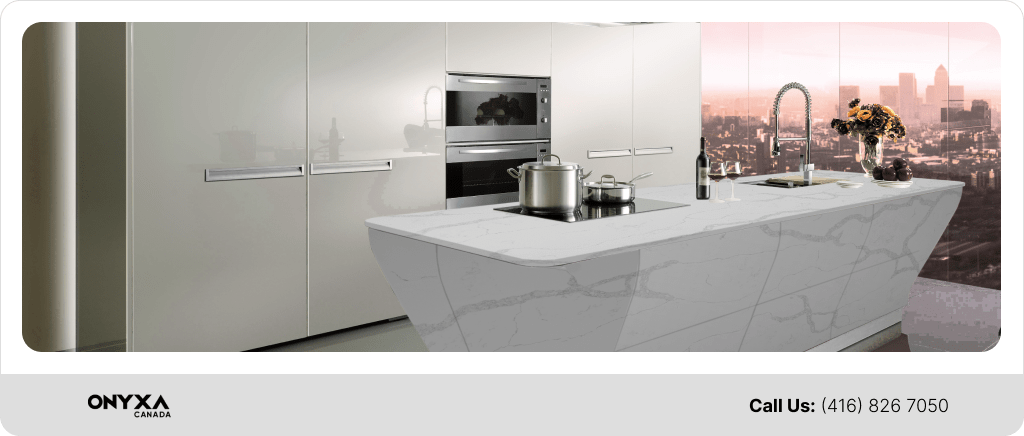
Quartz kitchen countertops, born from one of the toughest minerals, offer resilience and beauty. With colours from vibrant reds to calming creams, they mimic granite or marble with intricate veining and sparkles. While factory-crafted, they blend design and engineering. Yet, one drawback is their vulnerability to extreme heat.
Pros:
- Durability:
Quartz countertops are highly durable and resistant to scratches and impacts, making them suitable for high-traffic areas like kitchens. - Variety of Colors and Patterns:
They come in various colours and patterns, allowing you to find the perfect match for your kitchen’s aesthetic. - Low Maintenance:
Unlike natural stones, quartz countertops do not require sealing, and they are easy to clean with just soap and water. - Non-Porous:
Quartz is non-porous, making it resistant to stains, spills, and bacteria growth. - Consistency:
Unlike natural stones, quartz countertops offer consistent colours and patterns throughout the surface.
Cons:
- Vulnerability to Heat:
Quartz countertops can be sensitive to extreme heat, so trivets or hot pads are recommended to prevent damage from hot pots and pans.
Cost Overview:
While the cost of quartz kitchen countertops can vary based on brand, design, and installation, they generally fall from $50 to $120 per square foot. This range encompasses both material and installation costs.
#3. Quartzite Countertops:
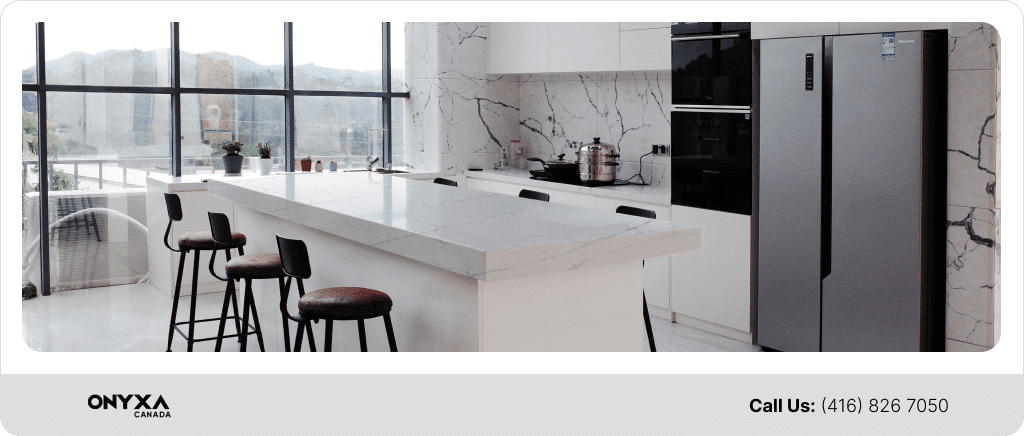
Quartzite countertops present an elegant and enduring natural stone choice for your kitchen. Often mistaken for marble due to their resemblance, quartzite merges the allure of marble with granite’s durability. Emerging from heated sandstone, quartzite possesses impressive solidity and heat resistance. Its distinctive sparkling pattern adds a decorative flair to its robust nature. Quartzite countertops become a standout selection when seeking lasting beauty and strength.
Pros:
- Elegant Aesthetics:
Quartzite countertops often resemble marble, offering a luxurious, sophisticated appearance that elevates your kitchen’s style. - Durability:
As a natural stone formed through heat and pressure, quartzite is highly durable and can withstand the rigors of daily kitchen activities. - Heat Resistance:
Quartzite is naturally heat-resistant, making it suitable for placing hot pots and pans directly on the surface without damage. - Unique Patterns:
Each quartzite slab features unique patterns and colours, adding character and individuality to your kitchen. - Stain Resistance:
Quartzite is generally resistant to stains, making it easier to clean and maintain.
Cons:
- Maintenance:
While quartzite is relatively low-maintenance, it requires periodic sealing to prevent stains and ensure longevity. - Cost:
Due to their durability and elegant appearance, quartzite countertops can be more expensive than other natural stone options. - Limited Color Range:
Compared to other materials, the colour range of quartzite may be limited, which could impact your design choices. - Natural Variations:
While the unique patterns are a pro, they can also be a con if you want a more consistent and uniform appearance.
Cost Overview:
Usually falls within the mid to high price range, ranging from $70 to $150 per square foot.
#4. Engineered Stone Countertops:
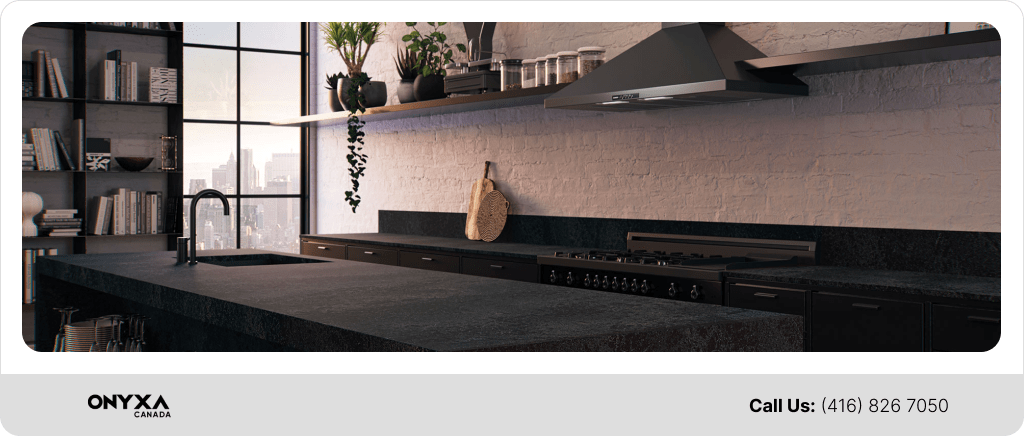
Engineered Stone Countertops offer a contemporary solution for those seeking aesthetic appeal and durability in their kitchen surfaces. Also known as quartz surfaces, engineered stone countertops are crafted by blending crushed natural quartz with resins, resulting in a surface that mirrors the elegance of natural stone while providing enhanced strength and resistance.
These countertops are available in various colours, patterns, and finishes, catering to diverse design preferences. One remarkable feature is their non-porous nature, making them resistant to stains and spills and requiring minimal maintenance.
Engineered stone countertops also excel in heat resistance, making them suitable for cooking environments. Their consistent appearance across slabs ensures a uniform look, distinguishing them from natural stone.
As a bonus, these countertops offer hygienic surfaces, inhibiting the growth of bacteria. For homeowners seeking a blend of style, resilience, and easy upkeep, engineered stone countertops are a modern and practical choice for their kitchens.
Pros:
- Aesthetic Variety:
Engineered stone countertops come in diverse colours, patterns, and finishes, allowing you to find the perfect match for your kitchen’s design. - Durability:
Combining crushed natural quartz with resins results in a highly durable surface that can withstand the demands of daily kitchen use. - Non-Porous:
Engineered stone countertops are non-porous, which means they are resistant to stains and spills, making cleaning and maintenance hassle-free. - Heat Resistance:
These countertops excel in heat resistance, making them suitable for placing hot pots and pans directly on the surface without damage. - Consistency:
Engineered stone countertops offer a consistent appearance across slabs, ensuring a uniform and cohesive look in your kitchen.
Cons:
- Limited Natural Look:
While they mimic the appearance of natural stone, some homeowners prefer the unique variations and patterns found in genuine natural stone. - Vulnerability to Damage:
While durable, engineered stone countertops are not entirely impervious to damage and can chip or crack under specific impacts. - Maintenance:
While generally low-maintenance, engineered stone countertops may require occasional sealing, depending on the specific brand and type, to maintain their best condition.
Cost Overview:
The cost of engineered stone countertops can vary based on the brand, design, and installation complexity. On average, you can pay around $60 to $150 per square foot, including the material and installation costs.
#5. Marble Countertops:
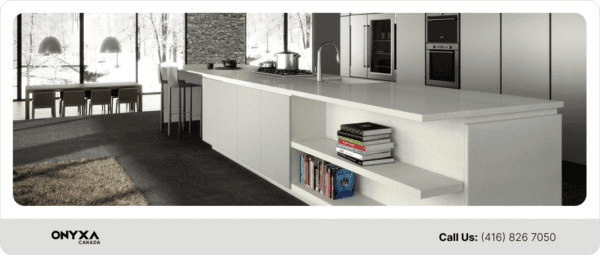
Marble countertops embody timeless elegance, bringing a touch of luxury to your kitchen. These countertops are a classic choice that exudes sophistication and beauty.
With its unique veining and diverse colour palette, each marble slab is a work of art, offering your space a unique aesthetic.
This natural stone is well-loved for its excellent and smooth surface, making it ideal for tasks like baking and pastry-making. While marble countertops boast stunning visual appeal, they require some care to maintain their lustre.
It’s important to note that marble is softer and more porous than other materials, making it vulnerable to scratches and stains. Regular sealing is recommended to protect the surface and prolong its beauty. If you’re captivated by the allure of classic elegance and are willing to invest extra care, marble countertops are the perfect choice to elevate your kitchen’s style.
Pros:
- Timeless Elegance:
Marble countertops exude classic sophistication, adding a touch of timeless beauty to your kitchen. - Unique Veining:
Each marble slab features distinctive veining and patterns, ensuring a one-of-a-kind aesthetic in your space. - Cool Surface:
Marble’s cool, smooth surface is perfect for baking and pastry-making, offering a comfortable workspace. - Variety of Colors:
Marble comes in various colours, from whites and grays to more vibrant shades, allowing you to choose a style that suits your kitchen.
Cons:
- Porous Nature:
Marble is more porous than other countertop materials, making it susceptible to stains and spills. Regular sealing is essential to protect the surface. - Vulnerability to Scratches:
Marble is softer than materials like granite so it can be more prone to scratches and nicks from sharp objects. - Maintenance:
Marble countertops require more maintenance to keep them looking their best. This includes regular sealing and careful cleaning to prevent damage and stains.
Cost Overview:
The cost of marble countertops can vary significantly based on factors such as the type of marble, its rarity, and the complexity of installation. On average, you can pay around $50 to $150 per square foot, including the material and installation costs.
However, it’s important to note that certain high-end and rare marble varieties can push the price higher.
Additionally, installation costs can vary based on your location and the intricacy of the design.
While marble countertops can be more expensive than other materials, their timeless beauty and unique character often make them a sought-after choice for homeowners looking to create a luxurious and elegant kitchen ambiance.
Making the Right Choice: Factors to Consider
When it comes to picking the perfect countertop, porcelain slabs shine. These countertops offer style and strength, resembling natural stone while being tough as nails. With various colours, patterns, and finishes, you can find the look that suits your style. On the other hand, Marble oozes timeless luxury, with its unique veins and colours making each piece a work of art. So, what should you consider when making your decision?
Durability is a significant factor. Porcelain slabs are rugged and low-maintenance, while marble needs more care due to its softer nature. Your lifestyle matters too. If you’re a cooking enthusiast, the heat resistance of porcelain slabs might appeal to you. Conversely, marble could be your choice if you love classic elegance and don’t mind some extra care. Budget is essential, too, as marble can be pricier due to its unique looks.
Remember, you’re not alone in this decision. If you’re feeling overwhelmed, Onyxa is here to help. Their experts can guide you through the options so that you can pick the perfect countertop for your style, life, and wallet. Your kitchen will be the ideal blend of beauty and functionality with their assistance.
Or call us: +1 (416) 854.8645
Related Articles:
Related: Luxury home renovation ideas
